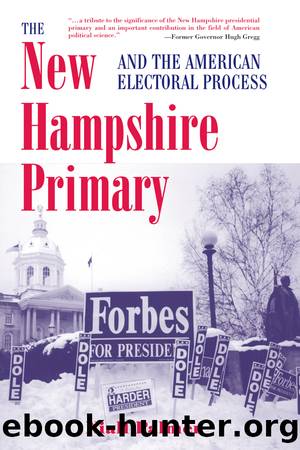The New Hampshire Primary and the American Electoral Process by Niall A. Palmer

Author:Niall A. Palmer [Palmer, Niall A.]
Language: eng
Format: epub
Tags: Political Science, General
ISBN: 9780429975806
Google: _tFMDwAAQBAJ
Goodreads: 38795376
Publisher: Routledge
Published: 1997-09-16T00:00:00+00:00
Conclusion
The nomination and delegate selection reforms undertaken by the Democratic party and, in most instances, imposed on the Republicans during the 1960s and 1970s had been intended to improve the quality of leadership and representation in American national politics. This impulse to deliver the power of candidate selection from party officialdom into the hands of the primary electorate was successful but carried a number of unforeseen and unintended consequences, all of which complicated the nomination environment and many of which contributed to the rapid rise in status and influence of the New Hampshire primary. The weakening of party leadership cliques had the intended effect of opening up the system to activists and voters from all walks of life. Its unintended side-effect was to destabilize the Democratic party by flooding its leadership contests with inexperienced delegates and single-issue or candidate-centered activists. Proportionate delegate allocation rendered contests fairer but simply added to already overwhelming pressures for ever-earlier campaign starts and early primary successes, without which the long haul toward a delegate majority would be impossible to sustain. The reformers achieved their purpose in making presidential primaries the single most widespread and acceptable vehicle for nomination but only at the cost of creating a powerful new dynamic: media-sustained momentum.
Primaries relied far more than the more closed caucus system on journalistic interpretation to spread their message, thereby raising the importance of candidate-oriented media strategies and lowering the ability of the party apparatus to counter the progress of a popular but unelectable nominee. The combined effect was to enhance the role of early nomination contests. The New Hampshire primary, already an established tradition for both parties, mutated under these conditions from a useful test of public sentiment to a crucial battleground. The FECA reforms of 1971 and 1974 were intended to create a more level playing field for candidates and to squeeze out the influence of fat-cat donors. Yet FECA has unintentionally added to the stress now placed on the crucial early stages of the nomination cycle by forcing candidates to begin ever-earlier fund-raising drives and to seek early successes in Iowa or New Hampshire to sustain their campaigns. In its turn, the FECA rules help to create a brutal campaign environment in which increasing numbers of candidates withdraw before New Hampshire, aware that the locked-in dynamics of polling and expenditure make their bid for the White House impractical.
The window of opportunity for presidential hopefuls in the nineteenth and early twentieth century stretched to the convention balloting itself Candidates such as Blaine and McKinley were able to massage support slowly and surely in the preconvention period. Others, like Harding, could meet with little success in the late spring primaries but emerged triumphant in the convention balloting. The growth of primaries drew this window back as conventions never progressed beyond the first ballot and nominations were decided in the late spring. After the 1970s, the very first contests of the nomination year became crucial and the early spring decisive. The front-loading trend and the financial realities
Download
This site does not store any files on its server. We only index and link to content provided by other sites. Please contact the content providers to delete copyright contents if any and email us, we'll remove relevant links or contents immediately.
Spare by Prince Harry The Duke of Sussex(5176)
Navigation and Map Reading by K Andrew(5150)
Tuesdays with Morrie by Mitch Albom(4769)
Machine Learning at Scale with H2O by Gregory Keys | David Whiting(4292)
Cracking the GRE Premium Edition with 6 Practice Tests, 2015 (Graduate School Test Preparation) by Princeton Review(4279)
Never by Ken Follett(3937)
Goodbye Paradise(3799)
What It Really Takes to Get Into Ivy League and Other Highly Selective Colleges by Hughes Chuck(3749)
Fairy Tale by Stephen King(3370)
Harry Potter and the Prisoner of Azkaban (Book 3) by J. K. Rowling(3347)
Pledged by Alexandra Robbins(3170)
Kick Ass in College: Highest Rated "How to Study in College" Book | 77 Ninja Study Skills Tips and Career Strategies | Motivational for College Students: A Guerrilla Guide to College Success by Fox Gunnar(3118)
Reminders of Him: A Novel by Colleen Hoover(3092)
A Dictionary of Sociology by Unknown(3073)
Sapiens and Homo Deus by Yuval Noah Harari(3066)
The Social Psychology of Inequality by Unknown(3018)
Will by Will Smith(2908)
Graduate Admissions Essays, Fourth Edition: Write Your Way into the Graduate School of Your Choice (Graduate Admissions Essays: Write Your Way Into the) by Asher Donald(2907)
Zero to Make by David Lang(2778)
